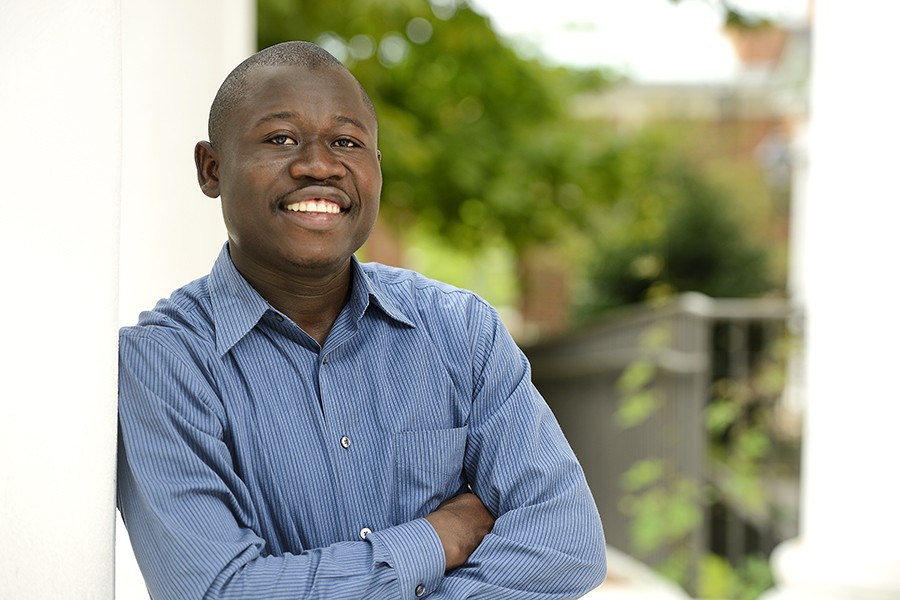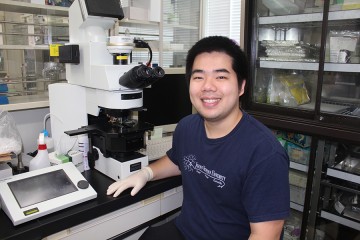The start to George Mwinnyaa's higher education experience in America was a humbling one. At 25, he was living with his wife outside Reno, Nevada, working as a school custodian as he applied to community colleges. A few programs turned him down.
Back home, in Ghana, he'd been a community health worker. But he had no high school transcripts to show.
Finally, after scoring well on an entrance exam, he got a chance to take a few classes at Western Nevada College.
"I always saw myself as being the last," Mwinnyaa says. "That made me work harder, and I ended up excelling the more and more I participated. That is how I got here."
"Here" is Johns Hopkins University. Just over a year ago, Mwinnyaa got in a car with his family—his newborn son, Kanyiri, was just 3 weeks old at the time—to make the cross-country move to Baltimore. He secured enough grants to spend his junior year in his top-choice program, public health studies.
Mwinnya, now 28, says his goal is to become a public health responder, working with infectious diseases like cholera and ebola.
A rare opportunity has pushed him closer to that goal—Mwinnyaa is one of only 15 students in the country to win acceptance to the National Institutes of Health's Undergraduate Scholarship Program, which gives him paid research training next summer, followed by year of full-time employment with an NIH research lab. The award also covers $20,000 of his senior-year tuition at Hopkins. Mwinnyaa is one of two winners from Johns Hopkins, along with Duy Phan, a rising junior studying neuroscience.
"It's a door-opening opportunity that I never knew existed before," Mwinnyaa says.
Though this path may seem far removed from Mwinnyaa's humble beginnings in Ghana, it's really quite connected to it.
The youngest of 32 children—his father, who died when he was 5, had seven wives—Mwinnyaa grew up in poverty and feeling the direct impacts of infectious disease. He lost several family members to diseases like cholera, malaria, and pneumonia. He has a distinct memory of a cholera outbreak that swept through his town very suddenly one day, killing five people within hours.
Also see
"Disease outbreak moves very fast there," he says, primarily due to intimate sharing of food and spaces.
Mwinnyaa gained new perspectives on these issues as he got older. Though he was admittedly unmotivated in high school—"there was no electricity, no library, no teachers, no support," he says—he found more direction when he started a job as a community health worker for Ghana Health Service. The work had him traveling on motorbike to rural parts of the country, organizing child welfare clinics, visiting homes, and giving immunizations to children.
"That was my exposure to public health," he says of this first glimmer of a career path. "I saw the impact of infectious diseases and how much it can affect families."
It was also on this job where he met his future wife, Leslie, a Peace Corps volunteer from Alaska who worked alongside him. The couple married in Ghana in 2012, as Mwinnyaa was starting to consider more formal education in public health—in Canada, he thought.
"She crashed my plans," Mwinnyaa jokes of his wife, who accepted a job as a school counselor in Fernley, Nevada. The couple moved there in 2013, and that's where Mwinnyaa's winding educational path began.
After his initial classes at Western Nevada, Mwinnyaa was accepted as a full-time student at Truckee Meadows Community College. He excelled there, graduating from the two-year program with a 4.0 GPA and fielding scholarship offers from several universities. He chose Johns Hopkins after winning enough grants to study full-time.
One day, Mwinnyaa says, he hopes to work for the Centers for Disease Control and Prevention. He'd like to be part of its Epidemic Intelligence Service, working on the ground as a public health responder in developing countries.
As a rising senior at Hopkins, he's already been accepted to the master's program in Infectious Disease Epidemiology at JHU's Bloomberg School of Public Health. He's currently exploring grants to fund those studies and figuring out how he'll coordinate the program with his NIH scholarship work.
There are an abundance of options, and Mwinnyaa embraces them. After seeing the dominoes line up the right way in Nevada, he says, "I had the realization, of, 'Hey, you can do anything you want.'"
For more information about the NIH Undergraduate Scholarship, visit http://fellowships.jhu.edu/.
Posted in Health, Student Life
Tagged public health, infectious disease, scholarships, nih









